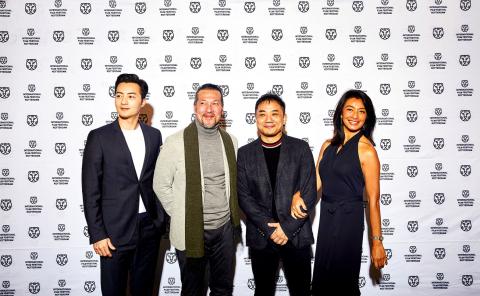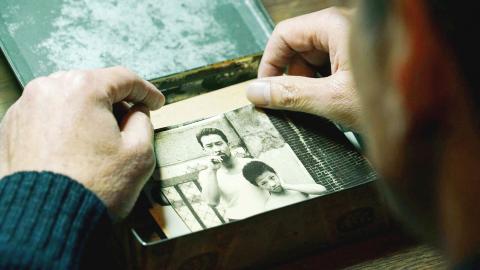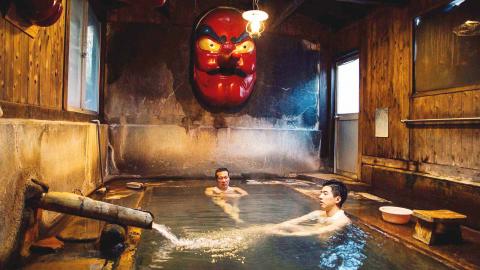Growing up, Taiwanese filmmaker Hsiao Ya-chuan (蕭雅全) shared a rocky relationship with his father. Solemn and overly frugal, his father was consumed with saving money, and faced difficulties communicating with his children, recalls the now 50-year-old.
“He was a very thrifty person because he grew up in very poor circumstances. But he didn’t know how to talk about his inner emotions, about his own sorrow and happiness, as though his entire life had been repressed by the lack of money,” Hsiao says.
These memories of his late father, who passed away five years ago, were what inspired the director to make his third feature Father to Son (范保德), which made its world premiere at the recently-concluded International Film Festival Rotterdam (IFFR). The fictional film was nominated for the VPRO Big Screen Award, alongside Taiwanese-Dutch coproduction An Impossibly Small Object by David Verbeek, though it did not win. It is set for a commercial release in Taiwan in September.

photo courtesy of Hsiao Ya-chuan
Father to Son follows protagonist Van Pao-te (Michael JQ Huang, 黃仲崑), who realizes on his 60th birthday that he is dying. With time running out, he heads to Japan with his own son in search of his father who abandoned him 50 years previously. At the same time, a young man with a mysterious connection to Van’s past travels from Hong Kong to Taiwan.
Much of Father to Son fleets between the past and the present over the course of its 115-minute running time — the film charts the complex relationships between intergenerational pairs of father and son, against the backdrop of Taiwan’s tumultuous history under colonial rule in the last century.
“Taiwan has a very complicated history — first it belonged to China, then it belonged to Japan and before that it was under Dutch rule. The search for the father in the film parallels a similar search for identity in the hearts of many Taiwanese,” Hsiao says.

photo courtesy of Hsiao Ya-chuan
As the father of a 13-year-old son and a 16-year-old daughter himself, the director says he is determined not to follow in his late father’s footsteps when it comes to his own children.
“My father’s frugality created a sense of insecurity in me, as if the family could run out of money anytime. There was a feeling of poverty, where we never had enough to do the same things other people could. When I had my own family, I really hoped my children would not have the same feeling.”
Yet Hsiao admits that try as he might, the apple never falls far from the tree, as the characters in his film demonstrate.

photo courtesy of Hsiao Ya-chuan
“We don’t know if it’s because of our genes or the environment we’ve grown up in since [we were] young, but it’s always difficult to break away from the influence of our families. My friends and I realize that strangely, as we grow older, we are becoming more like our fathers.”
Father to Son marks Hsiao’s return to the silver screen after an eight-year-absence since his second feature, Taipei Exchanges (第36個故事, 2010), which was released a decade after his debut Mirror Image (命帶追逐, 2000). The director says these prolonged filmmaking droughts were not due to creative blocks; instead he was busy shooting television commercials amid a perceived slowdown in the Taiwanese film industry.
“The atmosphere for movies was not as great before. The industry for television commercials is more matured, so many people who liked to shoot films went to do that. But the film industry has been getting better recently, so a lot of older people like me who turned to commercials are now returning to film.”
And like his two previous films, Father to Son is also the third of Hsiao’s films to have legendary Taiwanese filmmaker Hou Hsiao-hsien (侯孝賢) on board as executive producer. Hsiao served as Hou’s assistant director on the set of his 1998 film, Flowers of Shanghai (海上花).
“After I finished working on Flowers of Shanghai, I wanted to make my own film (Mirror Image) so I invited Hou to be my supervisor and he agreed. It was a very natural process, him advising me and us working together. And it became a habit,” he says.
With the duo having collaborated on a number of successful productions together, one might wonder if Hsiao often gets compared to the older Taiwanese maestro by outsiders, or perhaps even feel overshadowed by his mentor.
“Every author is afraid of being like another person. Hou Hsiao-hsien is a very renowned and powerful director and because he has always supported me, my biggest fear is to be like him. But of course, we have creative differences when it comes to the aesthetics of film,” says Hsiao, adding that they always work things out eventually.
“He is an elder who takes very good care of the younger generation, and I feel very honoured that he is looking after me,” Hsiao says. “I would never think that he is blocking my spotlight.”

April 14 to April 20 In March 1947, Sising Katadrepan urged the government to drop the “high mountain people” (高山族) designation for Indigenous Taiwanese and refer to them as “Taiwan people” (台灣族). He considered the term derogatory, arguing that it made them sound like animals. The Taiwan Provincial Government agreed to stop using the term, stating that Indigenous Taiwanese suffered all sorts of discrimination and oppression under the Japanese and were forced to live in the mountains as outsiders to society. Now, under the new regime, they would be seen as equals, thus they should be henceforth

Last week, the the National Immigration Agency (NIA) told the legislature that more than 10,000 naturalized Taiwanese citizens from the People’s Republic of China (PRC) risked having their citizenship revoked if they failed to provide proof that they had renounced their Chinese household registration within the next three months. Renunciation is required under the Act Governing Relations Between the People of the Taiwan Area and the Mainland Area (臺灣地區與大陸地區人民關係條例), as amended in 2004, though it was only a legal requirement after 2000. Prior to that, it had been only an administrative requirement since the Nationality Act (國籍法) was established in

With over 80 works on display, this is Louise Bourgeois’ first solo show in Taiwan. Visitors are invited to traverse her world of love and hate, vengeance and acceptance, trauma and reconciliation. Dominating the entrance, the nine-foot-tall Crouching Spider (2003) greets visitors. The creature looms behind the glass facade, symbolic protector and gatekeeper to the intimate journey ahead. Bourgeois, best known for her giant spider sculptures, is one of the most influential artist of the twentieth century. Blending vulnerability and defiance through themes of sexuality, trauma and identity, her work reshaped the landscape of contemporary art with fearless honesty. “People are influenced by

The remains of this Japanese-era trail designed to protect the camphor industry make for a scenic day-hike, a fascinating overnight hike or a challenging multi-day adventure Maolin District (茂林) in Kaohsiung is well known for beautiful roadside scenery, waterfalls, the annual butterfly migration and indigenous culture. A lesser known but worthwhile destination here lies along the very top of the valley: the Liugui Security Path (六龜警備道). This relic of the Japanese era once isolated the Maolin valley from the outside world but now serves to draw tourists in. The path originally ran for about 50km, but not all of this trail is still easily walkable. The nicest section for a simple day hike is the heavily trafficked southern section above Maolin and Wanshan (萬山) villages. Remains of